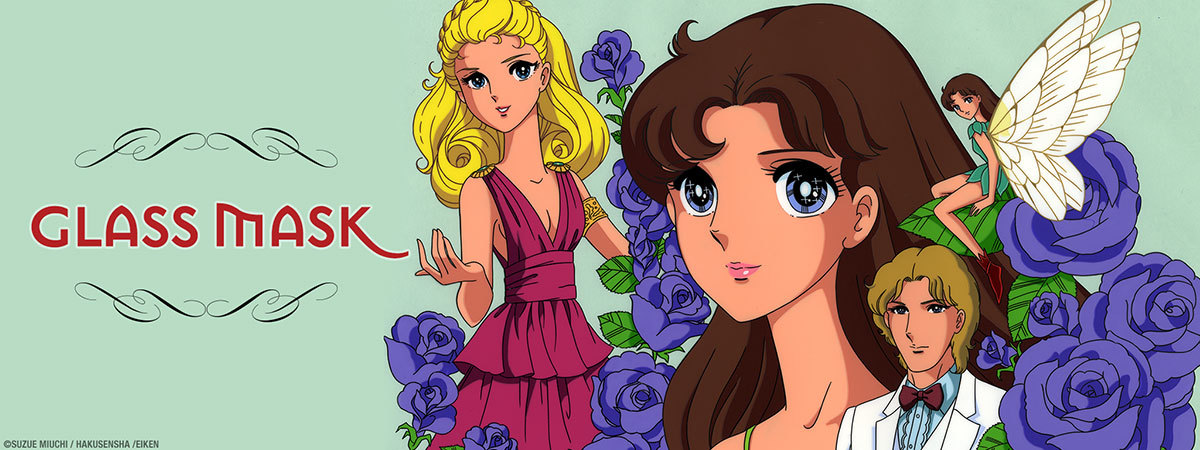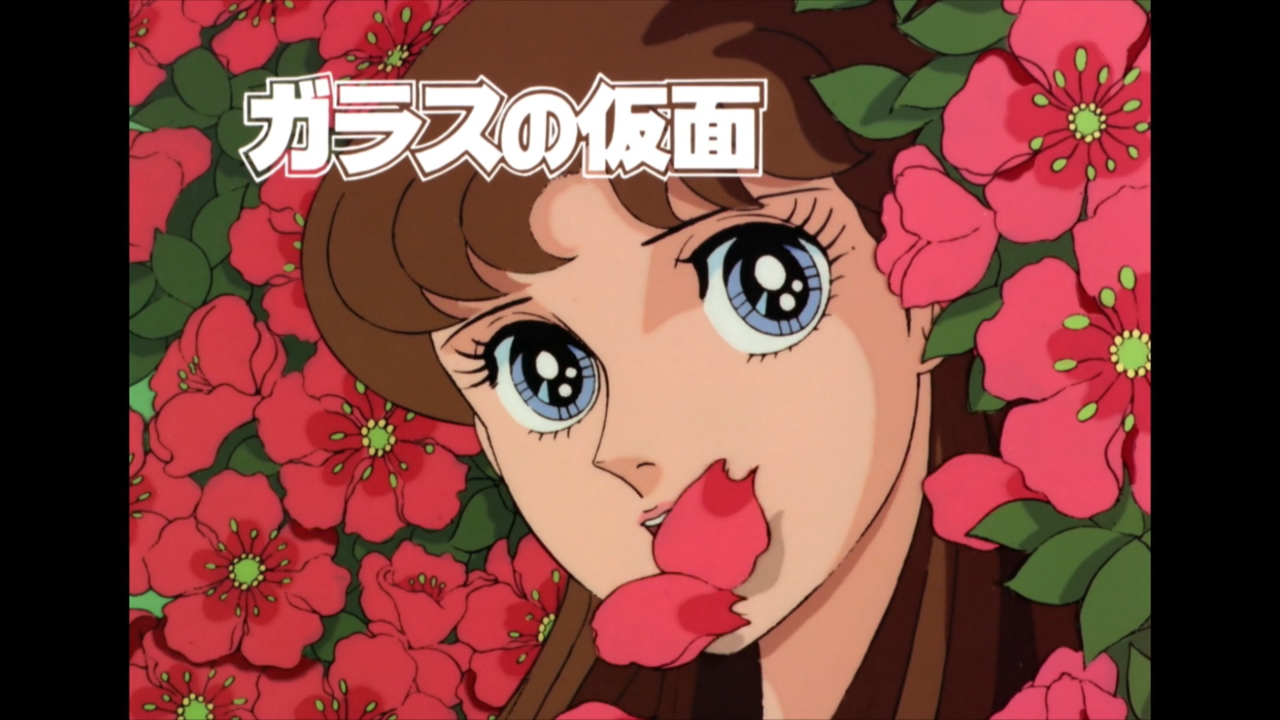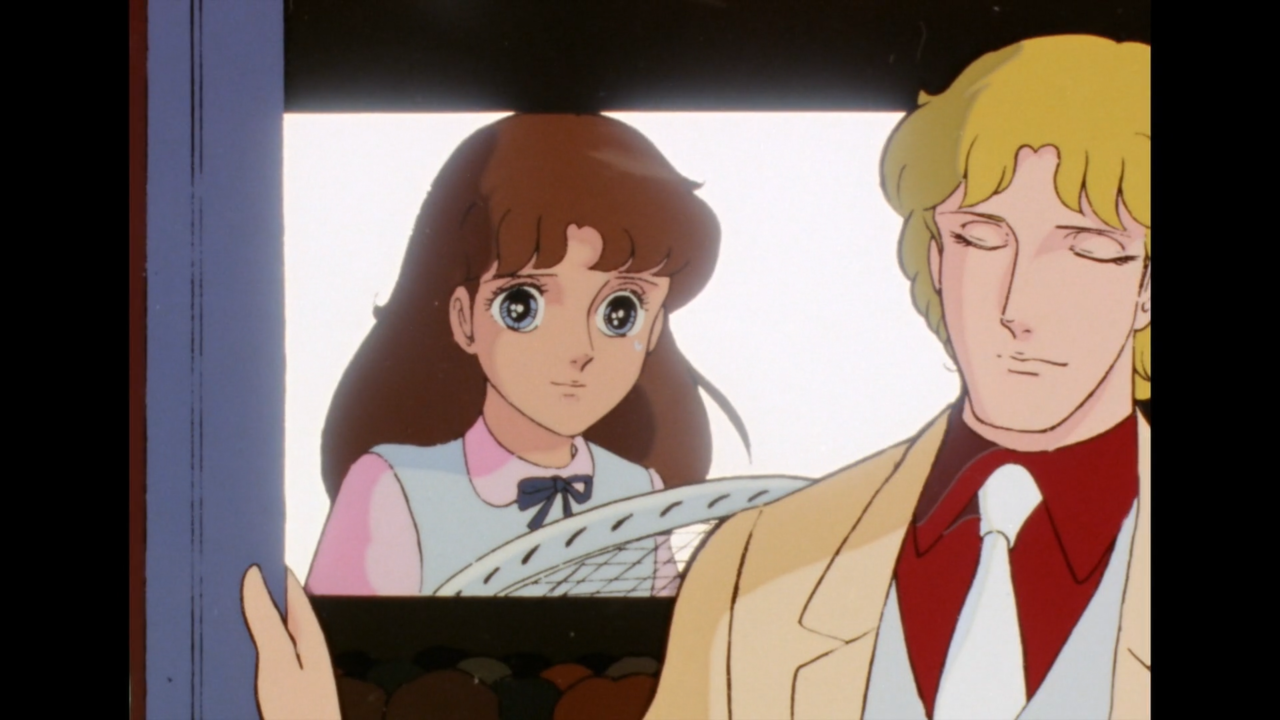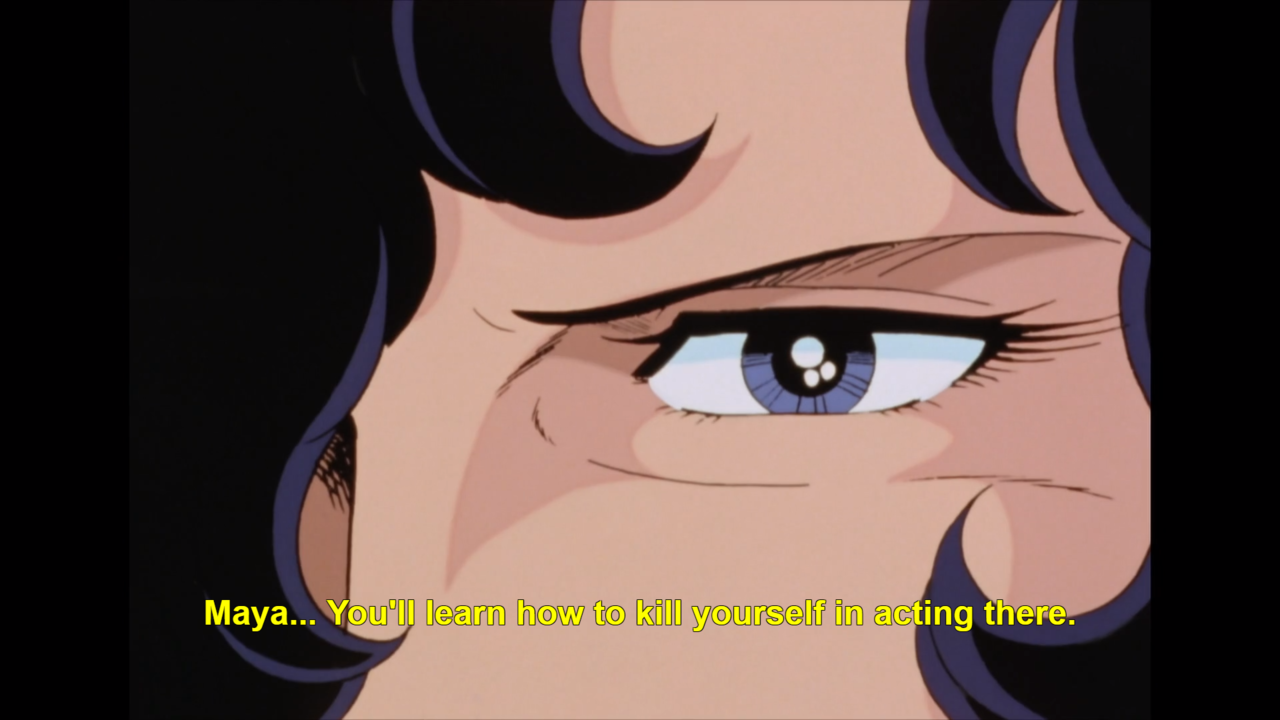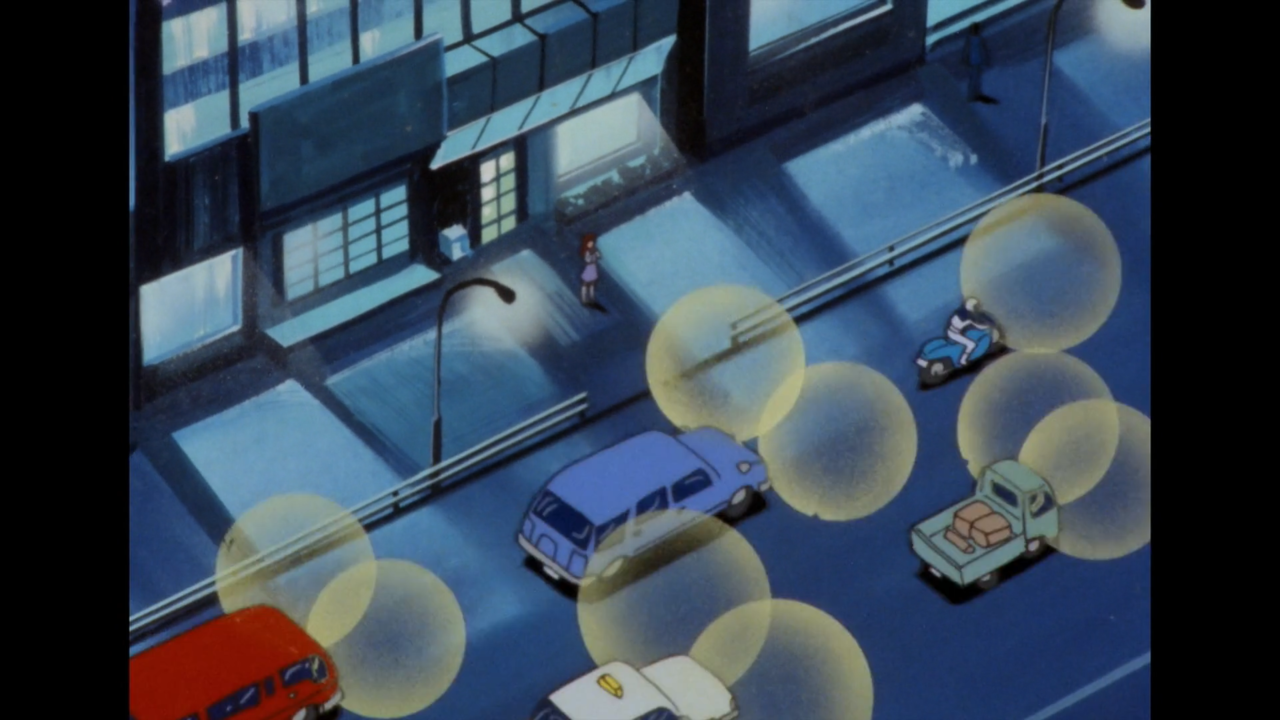You know what though, I kind of ironically enjoy all of this. Yeah, pure romance anime can be cheesy, but it’s just the right amount cheese that it’s like, c’mon, how can you not enjoy this? Perhaps the worst (or best!) offender of this are older shoujo titles where they can seem almost downright like a soap opera at times. Shows like these are just so full of bizarre, off-the-walls, and over-the-top melodrama that they manage to suck me completely in. They’re heartbreaking, they’re engaging, and the times when they fail at being those things they are hilarious.
My most recent experience with an older shoujo title like this would have to be studio Eiken’s 1984 adaptation of Glass Mask. Now Glass Mask (or Glass no Kamen as it is known by some) is a manga that started life in 1976 and to this day has yet to be finished, with the manga creator Suzue Miuchi stating she would like to finish it soon, but hasn't quite figured out when that will be (move over Hunter x Hunter fans). Having been one of the earlier shoujo titles starting back in the mid-70’s the series is full to the brim with pretty much every cliche and trope you can think of for shoujo anime, and to a modern audience it can often be almost hilarious at times to sit through. It is important to remember that for its time Glass Mask was a trend-setter and arguably if not the creator than certainly the reason why a lot of these cliches became cliches in the first place. Over the years Glass Mask has received its fair share of adaptations and even parodies, and currently has 3 different animes as well as a live action drama series and real life stage plays based on it. I heard the most recent anime, the 2005 TMS adaptation of Glass Mask, does a pretty great job at modernizing several aspects of the series, but unfortunately I have yet to watch that to weigh in so all I can say is that I was inundated with more cliches than I could count and laughed a ton while watching the 1984 series and I loved every minute of it.
Glass Mask is the story of a young 13 year old girl Maya Kitajima, who has a dream to be a great theatre actress. Unfortunately for Maya she’s from a very poor family, and even more unfortunately for her, she is incredibly average looking with no flair--and don’t worry, the anime will remind you of that fact countless times every episode. Despite her damnable curse of “just looking kind of average” Maya will stop at nothing to pursue her dream and eventually runs away from home after getting a scholarship for an acting school. There, the enigmatic Chigusa Tsukikage notices Maya’s talents and takes her on as her protege. Soon, Maya learns that her mentor Tsukikage was once a legendary actress thought to be truly one of the all time greats who due to a tragic Phantom of the Opera style accident had her face hideously scarred and retreated out of the spotlight.
Tsukikage is looking to pass on her talents to the future generation and eventually pass on her greatest possession, the rights to the elusive Crimson Goddess play--a supposed legendary masterpiece that has not been seen by anyone in decades; not since Tsukikage’s career ruining accident. For some reason the director and creator of the the Crimson Goddess play saw it fit to beseech all the rights to his masterpiece to Tsukikage and thus nobody else has been able to produce this elusive phantom play since. It won’t be easy for Maya and the Tsukikage acting school, as media conglomerate and mega corporation Daito Entertainment will stop at nothing to get the rights to the Crimson Goddess, and isn't afraid to sabotage them at every step of the way. Perhaps Maya’s greatest rival however is the young Ayumi Himekawa, the daughter of an already famous actress who is said to be the favorite to inherit the Crimson Goddess role, and is everything Maya isn't; beautiful, rich, famous and well loved by all, and while not a student of Tsukikage she is more than willing to pass on the rights to Himekawa if Maya fails to prove herself.
It’s easy to already see the cheesiness just from me trying my best to summarize the basic plot, and we haven’t even gotten into the romances yet. Maya’s relationship with the young Yu Sakurakoji is fairly simple at first, as he helped rescue her from a feral dog and despite being in rival acting schools--one affiliated under Daito no less, he’s a pretty chill guy that enjoys spending time with her and doesn't care about all that stuff. It’s only after Maya starts to take off in her career that Sakurakoji starts to spiral into this insane inferiority complex centered around her, where he thinks she has become too good an actress for him to be around anymore and starts to give her the cold shoulder all because of his own make-believe shortcomings. It’s very odd and sudden, and the entire thing is blown out of proportions as Maya clearly does not think that and Sakurakoji eventually has to be lectured by bad boy Masumi of all people to come around again and start spending time with Maya again. Even though he eventually starts being around Maya again it isn't like the old days anymore and the gap that was created from his action still exist.
And oh boy, don’t get me started on Masumi, he’s quite the character. Masumi Hayami is the 24 year old son of the president of Daito Entertainment and is currently running the corporation in his father’s stead. Masumi serves as both an antagonist and love interest (because of course he can be both) in the early parts of the story and is often behind some (but not all) the sabotage done to Tsukikage’s acting school. Masumi will eventually take a more reasonable approach when it comes to trying to yank the rights of the Crimson Goddess away from Tsukikage’s hands as the anime progresses, often just by having his acting school beating Tsukikage’s students in contest and the like, and it’s here where we usually see Masumi’s employees that work under him being the more underhanded characters instead of Masumi directly engaging in the conflict.
Despite being on different sides, so to speak, Masumi catches one of Maya’s earliest performances, her role as Beth in Little Women, and falls in love with the young girl, impressed by both her potential as an actress and her fortitude for going on with the show despite suffering from a dangerously high fever and immediately being rushed to the doctors after the curtains fall. From this point on her takes the role of “Mr Purple Roses” named for the bouquet of purple roses he sends to her at every show. As her secret admirer and the first fan Maya has ever had he means a lot to her yet as his true identity of Masumi he’s an enemy that Maya cannot stand to breathe the same air as. So in short, Masumi is just your average 24 year old CEO of a mega corporation crushing on a 13 year old girl from a small acting school he is trying to ruin and also her secret admirer. Somehow Masumi is one of the best characters in the series, and is my best boy. Only in shoujo!
So far I've been having some cheap laughs at the expense of the 1984 Glass Mask anime but it’s not all like this. The over-the-top bombardment of old school shoujo cliches and the laughs I got from them may be one of the most memorable component of my viewing but there’s actually a lot more to this anime than that. When you get beyond the silly age gap romances and the flowery melodrama of young teenage love, Glass Mask is a story of artists trying to pursue their passions and dedicating their everything to them. Maya may be cursed to forever be “only average looking” but I really respect her drive to dedicate her entire life to theatre.
Well, that is to say, the times when she isn't acting like punching bag to the rest of the cast (Glass Mask has a tendency to make Maya into a Cinderella surrounded by tons of wicked stepsisters). When Maya is written not as a Cinderella she’s fiercely determined, and never backs down despite some straight-up abusive behavior she is put through. At times her mentor Tsukikage is absolutely savage, regularly beating Maya and putting her through some training that is definitely highly illegal, at least for today’s standards. For instance she once threw Maya in a shed and locked the door refusing to let her out until she finally understood her character she was assigned. Did I mention it was in the middle of the freezing cold winter and snowing out and Maya only had the clothes on her back for warmth? She was out there for days with no food, water, or even warmth. But don’t worry, she had her script to read and that made it all okay. Like goddamn, somebody call child protective services on this lady.
Speaking about “the art” and everyone’s passions, the more you watch the series the more it becomes obvious that the creator, Suzue Miuchi, really cares for theatre and isn't just using it as a vehicle to propel her own story. There are countless renditions of classic plays shown in Glass Mask, such as the mentioned already Little Women, The Miracle Worker, and Wuthering Heights, just to name a few. Some of these plays are presented without any changes while others may have reinterpretations made to them by the characters who are trying to give their roles a life of their own away from the original source material. Miuchi very much understands theatre and does a great job converting many famous plays into a more compressed and easily digestible form of entertainment that can be viewed on a week by week bases. The analysis characters give about the plays and other characters’ performances, the ways characters interpret their parts, and how the plays that we are privy to see in the series end up all show a deeper understanding of the medium. Watching Glass Mask is almost like taking a beginning course in theatre that covers all the classics, only with way more melodrama and over-the-top romance than you will find in your local theatre group. I hope.
What’s the most impressive however goes beyond just Miuchi’s renditions of other classic works and instead are her own plays that she creates herself. As not only does Glass Mask use pre-existing plays it also has its own original productions that will spring up in-between the real world plays. A lot of these self created plays are very enjoyable too, and some feel way more fleshed out than they have any right to be and you often find yourself regretting that you are only privy to a small part of the performance and not able to just sit there and watch the entire play like the characters in the anime do. Maybe that’s why it shouldn't be too much of a surprise that some of the plays Miuchi has created for her manga have later been adapted into real life plays in Japanese theatres. This is probably the greatest testament to the series’ popularity right there, where its own fictional works are turned real. I can’t think of many examples of something like that happening before.
I’d be remiss not to mention the visual aspect of this series before wrapping up my thoughts on it too. While certainly no powerhouse in animation, Glass Mask 1984 goes for a more picturesque route, and does a great job with tons of beautiful still shots and intricately detailed background images. It’s a humble production but with the right use of lighting a lot of scenes can really shine (pardon the terrible pun it was an accident), especially the night shots which can be pure art. Hang it in a museum, I say. I’m almost surprised we don’t see more “aesthetic” anime blogs mining images from this series. Veteran director Gisaburo Sugii (Dororo, Touch, Osamu Tezuka’s Phoenix) leads the production with skilled marksmanship you would expect from his previous (and future) pedigree, and along with legendary animator the late Shingo Araki (Ashita no Joe, Galaxy Express 999, Saint Seiya) the series has a wonderful 80’s flair to it that just fills any retro anime fan full of nostalgia whether or not they have seen the show before.
Studio Eiken’s 1984 Glass Mask adaptation is a short, briskly paced 22 episode series that is easy on the eyes and not hard at all to still sit through for modern audiences. It’s full of tons of laughs (both ironic and sincere) as well as tons of melodrama and over-the-top romance. Most importantly though, it’s a full of passion; lots and lots of passion. During its short episode count the series watches Maya progress as an actress and grow older, with her finishing middle school and beginning high school while also balancing full time acting jobs on the side. The ending is left open--and let’s face it the manga hasn't even ended some 35 years later still--but there’s enough forward momentum in the series to really feel like your time with the characters wasn't wasted and that they were able to accomplish something--not to mention the ending spot is a pretty decent one leaving the viewer wanting more but enjoying a satisfying conclusion to one of the more interesting story arcs adapted. Overall I think anyone who enjoys cheesy anime romance can sit down with this series and have a fun Valentine’s.

